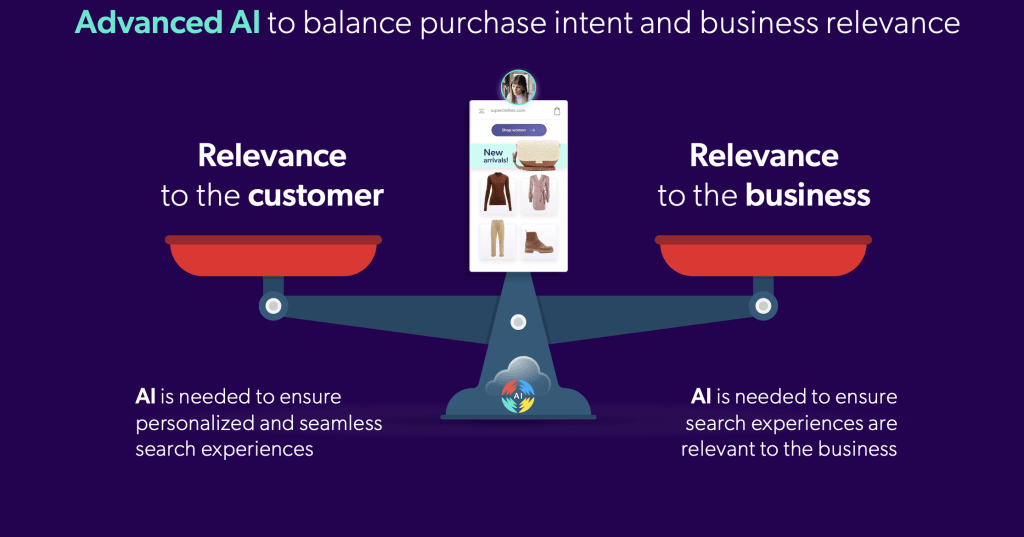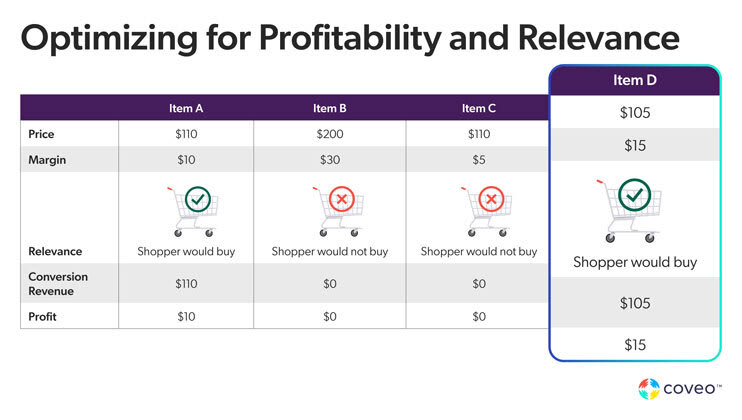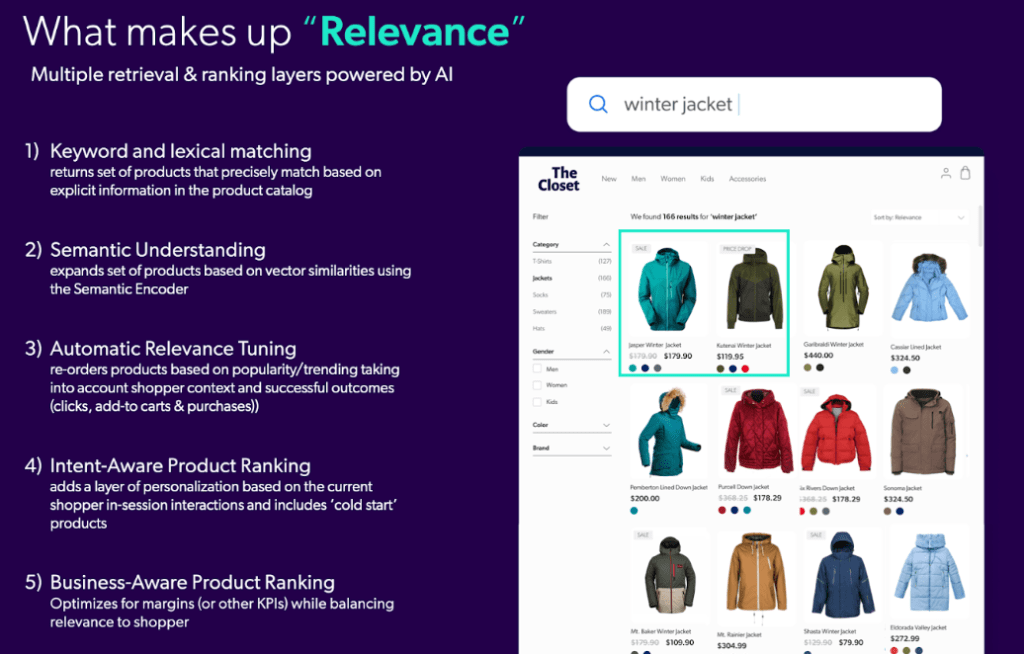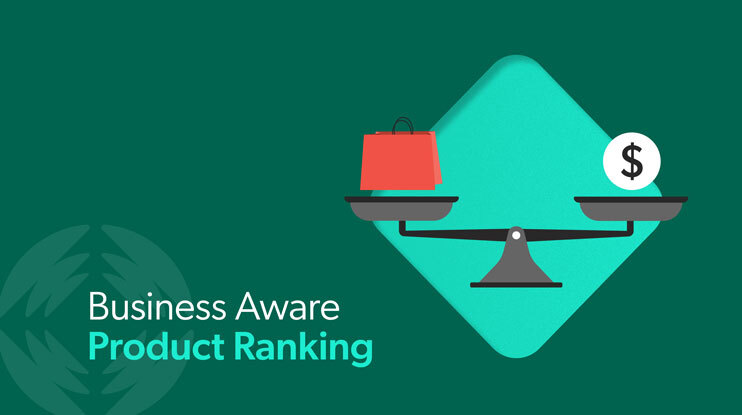Discover how Coveo AI can transform your ecommerce strategy by showing shoppers the products that are most aligned with their current purchase intent AND that maximize your revenue and margins.
Ecommerce players have long grappled with finding search and discovery tools that meet customer expectations and align with their business goals. Delivering relevant search and discovery experiences is essential for brands, retailers, and anyone selling online. After all, a search engine that fails to showcase your inventory means lost sales opportunities, while cluttered results can drive customers toward competitors.
Search and discovery experiences must not only present products that are attractive to shoppers and that they want to buy but also align with broader business priorities such as profit generation, inventory management, and supplier relations.
Many existing solutions that use technology not specifically built for ecommerce focus on KPIs like click-through rates, suitable for other contexts like news but less effective for ecommerce. When vendors promise “business optimization,” it often means layering business rules on top of search and recommendation engines. This can actually negatively impact the conversion rate and revenue of a site since you may be effectively ‘burying’ products that are more aligned with a shopper’s purchase intent in that moment.
The good news is that balancing relevance with business outcome optimization is now possible.

Coveo’s Business-Aware Product Ranking
Coveo’s newly introduced business-aware product ranking capabilities empower digital leaders to balance shopper purchase relevance with revenue and margins , ensuring that result sets are relevant to both customers and businesses. With an AI-first, KPI-agnostic approach, Coveo frees businesses from narrow optimization criteria, paving the way for increased profitability.
What is Business-Aware Product Ranking?
Business-aware product ranking is Coveo’s innovative application of machine learning, aiming to revolutionize ecommerce search and product discovery by balancing multiple objectives to ensure not only the relevance of products to customers but also optimizing for the business outcomes enterprises care about.
It addresses many different challenges today’s digital teams face:
- Optimized for popularity, not for ecommerce KPIs
- Manual optimization is not scalable
- Business rules can harm conversion
Optimized for Popularity, Not for Ecommerce KPIs
Most search and discovery solutions are built on top of Solr or Elasticsearch and are not truly optimized for ecommerce KPIs. For instance, they may focus on click-through rate (CTR) as a proxy of relevance, based on the assumption that more clicks indicate higher relevance to customers. These KPIs, however, are better suited for domains like news rather than ecommerce, as the approach can lead to vicious cycles of popularity, which significantly reduce profitability by both lowering revenue, as the most popular products (often those with the most clicks) are frequently discounted, and creating markdowns for other products, which never get surfaced to customers, ultimately leading to excess inventory.
Manual Optimization is Not Scalable
Many search and discovery platforms claim to help optimize business outcomes but merely allow merchandisers to apply business rules on top of their search and recommendation engines. These rules can certainly play a crucial role, enabling promotions like red items for Valentine’s day or seasonal goods such as chocolate bunnies for Easter. They can also help prioritize high-margin house brand products or the clearance of excess stock, or make summer clothes more visible to accelerate sales when fall approaches.
With ecommerce KPIs constantly changing due to seasonal shifts, inventory levels, and economic conditions, the significance of business rules in controlling experiences and rankings is clear. However, the real issue arises when these rules are used not to ensure alignment with marketing and merchandising strategies but to make up for the deficiencies in the ranking capabilities of search and discovery systems. This approach represents a significant missed opportunity, particularly in an age where AI’s value and capabilities are more recognized than ever. Over reliance on business rules ignores the potential of AI to craft dynamic, intelligent experiences. The responsibility of creating relevant experiences should not fall squarely on manual efforts.
Business Rules Can Harm the Bottom Line
Relying solely on business rules for optimizing business outcomes can often conflict with the fundamental principles of search and recommendation systems. This can result in a detrimental effect on customer experience by limiting the variety of products displayed, potentially obscuring items that customers genuinely seek. Instead of placing business considerations above AI, they should be integrated within your AI strategy to ensure the delivery of relevant and diverse result sets that enhance the bottom line. Unfortunately, however, typical search and discovery solutions lack machine learning models capable of applying AI to optimize multiple objectives, a critical feature given the myriad of trade-offs between objectives inherent in ecommerce.
Unleashing the Full Power of Relevance in Ecommerce Search and Product Discovery
The great news is that it is now possible to achieve the best of both worlds; delivering unparalleled customer experience while optimizing business outcomes through AI.
Fueled by a substantial accelerator grant received in 2022, Coveo has pioneered a suite of groundbreaking capabilities within the domain of Learning-to-Rank in ecommerce.
Coveo’s innovative solution stands out as KPI-agnostic, perfect for optimizing a range of ecommerce KPIs, such as Revenue per Visit (RPV) and marginality. Rather than applying business rules after AI has retrieved and reordered a result set, Coveo’s approach factors in business considerations as an integral part of your AI strategy.
Coveo customers now have the opportunity to use these cutting-edge features, which serve to bolster the suite of crucial AI models within Coveo’s comprehensive relevance framework.
Initially, the model will be used to optimize product rankings on ecommerce listing pages, based on customer feedback and demand, and given their substantial traffic volume. Next, these enhanced AI capabilities will be applied to optimizing search results.
The diagram below illustrates a scenario where AI is optimizing for both profitability and relevance, item D would be ranked highest. Item A would provide more revenue but lower profitability and items B and C would provide higher revenue and profit but are less relevant so the shopper is not likely to buy them, resulting in no conversion revenue.

Coveo’s Multi-Layered Approach to Relevance
By unveiling the innovative set of machine learning (ML) capabilities known as business-aware product ranking, Coveo has further augmented its already highly powerful suite of ML models, complementing its capabilities based on semantic search, 1:1 personalization, and popularity, creating an unmatched suite of AI models that all work in conjunction.

AI to Understand Intent Beyond Words
Semantic search goes beyond mere keyword matching by understanding the customer’s intended linguistic meaning. Thanks to Coveo’s “semantic encoder” machine learning model, a search for “winter jacket” for example, can reveal relevant results like “parka,” thanks to a deeper understanding of intent, even if the words “winter” or “jacket” aren’t included in the product metadata.
AI to Enhance Relevance Through Collective Insights
Leveraging general customer preferences and behavior is important to ensuring relevance and attractiveness of results. Coveo offers Automatic Relevance Tuning and Dynamic Navigation Experience models to reorder results and prioritize the most attractive results based on context and popularity.
AI to Unleash the Power of 1:1 Personalization
Achieving real-time 1:1 personalization is challenging, especially for infrequent visitors. Coveo leverages deep learning to enable personalized experiences based on real-time behavior, offering the AI model intent-aware product ranking for this purpose. For instance, it is possible to infer from real-time clickstream and product embeddings that a customer is interested in running shoes when they enter a generic search for “shoes”.
Drive Growth and Profits
Succeeding in ecommerce has never been easy.
Coveo’s advanced suite of AI models give you the power to deliver 1:1 personalized, relevant experiences at scale. With the further enhancements brought by business-aware product ranking, it enables ecommerce organizations to harness AI for a best-in-class customer experience – all while continuously optimizing for desired business outcomes.
Interested in learning more about what’s new in Coveo? Watch our webinar.


